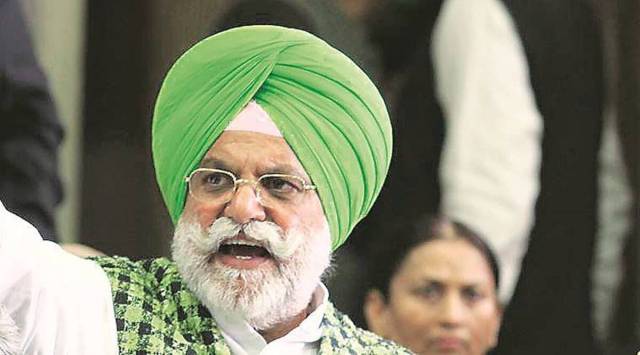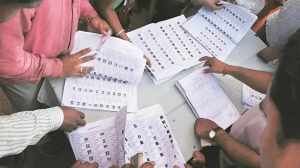Stay updated with the latest - Click here to follow us on Instagram
Ahead of results, Rana Gurjeet to PM: Save Punjab from turning into desert
He has also appealed to all the political parties to rise above their partisan considerations and draw a common minimum programme to save Punjab irrespective of which party or combination forms the government in the state.
 Appealing to all the political parties in the state, he urged them for consensus and unanimity on these issues at least, irrespective of the fact who the people of Punjab give their mandate to. (File)
Appealing to all the political parties in the state, he urged them for consensus and unanimity on these issues at least, irrespective of the fact who the people of Punjab give their mandate to. (File)Ahead of the Assembly election results, Congress leader and Cabinet minister Rana Gurjeet Singh has sought Prime Minister Narendra Modi’s intervention to save Punjab waters saying “the state is at the cusp of disaster”.
He has also appealed to all the political parties to rise above their partisan considerations and draw a common minimum programme to save Punjab irrespective of which party or combination forms the government in the state.
In a letter addressed to the Prime Minister, Rana said, “If these issues are not addressed right now, we will be staring at an imminent disaster which will have far reaching and wide ranging ramifications, not just for the state, but for the whole nation, as Punjab acts as a firewall against all enemies and their aggression.”
His letter assumes significance not only for raising the issue but also for the timing. Rana is considered very close to former CM Amarinder Singh. He had also fielded his son against Congress nominee from Sultanpur Lodhi as an Independent.
Rana said that agriculture was once the backbone of Punjab’s economy and the reason for its progress and prosperity. “The same progressive and well to do farmers are now debt ridden and can hardly survive and sustain with agriculture,” he said, adding that since the onset of the Green Revolution, the land holdings have mostly been reduced to one-fourth. “Majority of the farmers in Punjab, about 70% hold less than five acres. An entire family cannot survive on that”, he added.
With land holdings becoming so small, he suggested the revival of the cooperative movement in Punjab so that the small farmers can pool in their resources for efficient production.
Drawing the PM’s attention to depleting water table in the state, he said, it was the most serious threat to Punjab’s survival. “Scientific studies warn that Punjab runs the risk of turning into a desert within 20 to 25 years as groundwater is fast depleting,” he warned. While about 27% of land is irrigated by canal water, drawn from two and a half rivers, 73% of water is extracted from the ground. “Our water table is going down, on an average, by one meter every year. Right now Punjab’s water table has touched 300 feet. And the rate at which it is going down, it may go well below 600 feet in the next 20-25 years. Punjab will turn into a desert,” he said.
One way to save the situation is introduce drip irrigation, which saves about 50% water. Some states such as Maharashtra and Telangana have covered between 50 to 80% area under the drip irrigation. With decline in agriculture, Rana said, Punjab has seen the corresponding decline in industrial growth also. One of the main reasons is the special incentive to the neighbouring hill states like Jammu and Kashmir (which is now a Union Territory) and Himachal Pradesh at the cost of Punjab.
He added that Punjab has a long international border of about 600 km with Pakistan. “Like the government of India has extended the operational jurisdiction of the BSF up to 50 km, it must also incentivise this much of area for industrial growth, like tax holiday and freight equalisation,” he said, while suggesting, “this can be done on the pattern of the ‘Development of North Eastern Region’ (DONER) scheme where North-Eastern states because of their border with China and Bangladesh are getting massive incentives and ten percent of the union budget allocation is made towards DONER”.
He suggested introducing a skill development programme for youth in Punjab as a majority of educated youth do not possess sufficient skills to get jobs.
Appealing to all the political parties in the state, he urged them for consensus and unanimity on these issues at least, irrespective of the fact who the people of Punjab give their mandate to. “It is the issue of the survival of Punjab and Punjabis and we all owe it collectively to our people to address their pressing needs and necessities,” he said.







